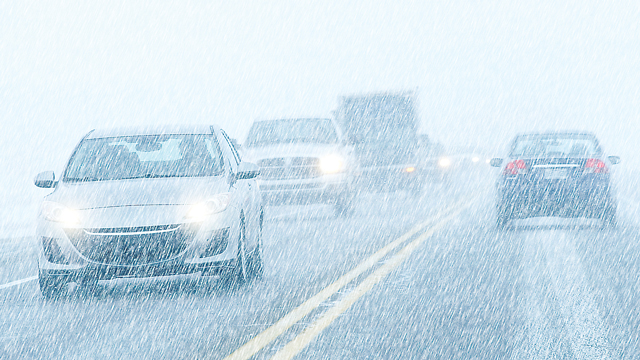It was one year ago this January that many of us watched the local and national news in disbelief as vehicles of all makes and models were stuck in a backup that stretched from the outskirts of Richmond to Northern Virginia.
Folks stranded on a frozen I-95 spent more than twenty-four hours in their vehicles with temperatures outside below freezing. Some drivers ran out of gas trying to stay warm, others spent a long night cycling their cars on and off to create some heat while conserving fuel. Everyone who was stuck in the backup became keenly aware of what they had in their vehicle that could help sustain them through the hours and hours of sitting and waiting.
The I-95 shutdown should be a wakeup call for everyone to be prepared.
Whether it’s driving on I-64 for a ski weekend or heading across town to try a new restaurant, drivers need to be prepared for weather-related shutdowns. It doesn’t take much – snow, ice, rain, or fog – to cause issues for drivers on the roads in Virginia.
The experts at AAA warn travelers to know before you go. If you have to be on the roads during foul weather, check weather and travel conditions along your route before heading out and along the way – only when you’re safely stopped; never while driving. Adjust your travel schedule and route accordingly.
Stock your weather emergency car kit.
All drivers should have an emergency kit in their vehicles, especially during the cold-weather months. Those trapped in the I-95 shutdown who had a fully stocked emergency kit were in better shape than those who didn’t have any emergency supplies with them.
A well-stocked kit can be an invaluable resource for a family stranded along the road in inclement weather. The kit should include:
• Abrasive material (sand, salt, cat litter) or traction mats
• Snow shovel
• Flashlight with extra batteries
• Window washer solvent
• Ice scraper with brush
• Jumper cables
• Extra warm clothing (gloves, hats, scarves), and blankets for everyone who might travel in the vehicle
• Warning devices (flares or triangles)
• Drinking water and non-perishable snacks for human and pet passengers
• First-aid kit
• Basic toolkit (screwdrivers, pliers, adjustable wrench)
• Mobile phone, charger, and power bank
Families should include items for kids, like shelf-stable, high-protein snacks. Coloring books, crayons, activity books, and anything else that might keep the kids’ attention for a period of time are also good to have on hand. And if you dip into your kit during a trip, make sure you restock.
Stranded in your vehicle?
If you do become stranded during a weather event, here are some important tips for safety:
• Stay with your vehicle. It provides temporary shelter and makes it easier for rescuers to locate you.
• Do not try to walk in a severe storm. It is easy to lose sight of your vehicle and get lost in the dark, rain, or blowing snow.
• Do not overexert yourself trying to dig out your vehicle. The abrasive material or traction mats in your vehicle’s emergency kit can help the vehicle’s tires gain traction on ice and snow. Even a vehicle’s floor mats can help in a jam.
• Mark your vehicle. Use your warning triangles or flares or tie a brightly colored cloth to the antenna or place a cloth at the top of a rolled up window to signal distress.
• Make sure the exhaust pipe is not clogged with snow, ice, or mud. A blocked exhaust pipe could cause deadly carbon monoxide gas to leak into the vehicle when the engine is running.
• If possible, turn on the car for brief intervals. Run the engine and heater just long enough to remove the chill and conserve gasoline.
One final but important note about cold-weather travel: Everyone in the car should be dressed for the weather outside, not for the temperature they’re hoping the heat will be set to inside the car. With a little luck, you will never need to use your emergency kit. When it comes to travel safety, it’s always best to prepare for the worst while you’re hoping for the best.




